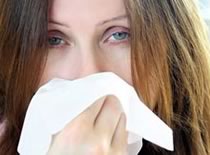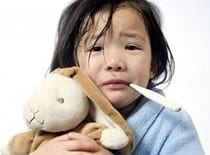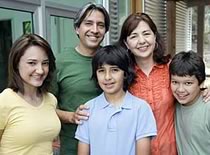Content on this page was developed during the 2009-2010 H1N1 pandemic and has not been updated.
- The H1N1 virus that caused that pandemic is now a regular human flu virus and continues to circulate seasonally worldwide.
- The English language content on this website is being archived for historic and reference purposes only.
- For current, updated information on seasonal flu, including information about H1N1, see the CDC Seasonal Flu website.
What To Do If You Get Sick: 2009 H1N1 and Seasonal Flu
January 10, 2010, 6:00 PM ET
How do I know if I have the flu?
You may have the flu if you have some or all of these symptoms:
- fever *
- cough
- sore throat
- runny or stuffy nose
- body aches
- headache
- chills
- fatigue
- sometimes diarrhea and vomiting
*It’s important to note that not everyone with flu will have a fever.
What should I do if I get sick?
 If you get sick with flu-like symptoms this flu season, you should stay home and avoid contact with other people except to get medical care. Most people with 2009 H1N1 have had mild illness and have not needed medical care or antiviral drugs and the same is true of seasonal flu.
If you get sick with flu-like symptoms this flu season, you should stay home and avoid contact with other people except to get medical care. Most people with 2009 H1N1 have had mild illness and have not needed medical care or antiviral drugs and the same is true of seasonal flu.
However, some people are more likely to get flu complications and they should talk to a health care provider about whether they need to be examined if they get flu symptoms this season. They are:
People at High Risk for Developing Flu-Related Complications
- Children younger than 5, but especially children younger than 2 years old
- Adults 65 years of age and older
- Pregnant women
People who have:
- Asthma
- Neurological and neurodevelopmental conditions [including disorders of the brain, spinal cord, peripheral nerve, and muscle such as cerebral palsy, epilepsy (seizure disorders), stroke, intellectual disability (mental retardation), moderate to severe developmental delay, muscular dystrophy, or spinal cord injury].
- Chronic lung disease (such as chronic obstructive pulmonary disease [COPD] and cystic fibrosis)
- Heart disease (such as congenital heart disease, congestive heart failure and coronary artery disease)
- Blood disorders (such as sickle cell disease)
- Endocrine disorders (such as diabetes mellitus)
- Kidney disorders
- Liver disorders
- Metabolic disorders (such as inherited metabolic disorders and mitochondrial disorders)
- Weakened immune system due to disease or medication (such as people with HIV or AIDS, or cancer, or those on chronic steroids)
- People younger than 19 years of age who are receiving long-term aspirin therapy
The Advisory Committee on Immunization Practices (ACIP) has issued separate recommendations on Who Should Get Vaccinated Against Seasonal Flu. Also, it’s possible for healthy people to develop severe illness from the flu so anyone concerned about their illness should consult a health care provider. There are emergency warning signs. Anyone who has them should get medical care right away.
What are the emergency warning signs?
In children
- Fast breathing or trouble breathing
- Bluish skin color
- Not drinking enough fluids
- Not waking up or not interacting
- Being so irritable that the child does not want to be held
- Flu-like symptoms improve but then return with fever and worse cough
- Fever with a rash
In adults
- Difficulty breathing or shortness of breath
- Pain or pressure in the chest or abdomen
- Sudden dizziness
- Confusion
- Severe or persistent vomiting
- Flu-like symptoms improve but then return with fever and worse cough
Do I need to go to the emergency room if I am only a little sick?
No. The emergency room should be used for people who are very sick. You should not go to the emergency room if you are only mildly ill. If you have the emergency warning signs of flu sickness, you should go to the emergency room. If you get sick with flu symptoms and are at high risk of flu complications or you are concerned about your illness, call your health care provider for advice. If you go to the emergency room and you are not sick with the flu, you may catch it from people who do have it
If you have the emergency warning signs of flu sickness, you should go to the emergency room. If you get sick with flu symptoms and are at high risk of flu complications or you are concerned about your illness, call your health care provider for advice. If you go to the emergency room and you are not sick with the flu, you may catch it from people who do have it
Are there medicines to treat 2009 H1N1?
Yes. There are drugs your doctor may prescribe for treating both seasonal and 2009 H1N1 called “antiviral drugs.” These drugs can make you better faster and may also prevent serious complications. This flu season, antiviral drugs are being used mainly to treat people who are very sick, such as people who need to be hospitalized, and to treat sick people who are more likely to get serious flu complications. Your health care provider will decide whether antiviral drugs are needed to treat your illness. Remember, most people with 2009 H1N1 have had mild illness and have not needed medical care or antiviral drugs and the same is true of seasonal flu.
How long should I stay home if I’m sick?
CDC recommends that you stay home for at least 24 hours after your fever is gone except to get medical care or for other things you have to do and no one else can do for you. (Your fever should be gone without the use of a fever-reducing medicine*, such as Tylenol®.) You should stay home from work, school, travel, shopping, social events, and public gatherings.
do and no one else can do for you. (Your fever should be gone without the use of a fever-reducing medicine*, such as Tylenol®.) You should stay home from work, school, travel, shopping, social events, and public gatherings.
What should I do while I’m sick?
Stay away from others as much as possible to keep from making them sick. If you must leave home, for example to get medical care, wear a facemask if you have one, or cover coughs and sneezes with a tissue. And wash your hands often to keep from spreading flu to others. CDC has information on “Taking Care of a Sick Person in Your Home”.
Get email updates
To receive weekly email updates about this site, enter your email address:
Contact Us:
- Centers for Disease Control and Prevention
1600 Clifton Rd
Atlanta, GA 30333 - 800-CDC-INFO
(800-232-4636)
TTY: (888) 232-6348 - Contact CDC-INFO


